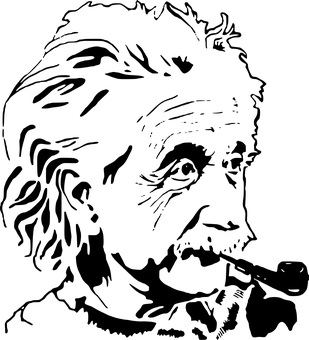
Source: Pixabay
I hear so many quotes attributed to Albert Einstein, it made me wonder what he really did say. So, I went searching. It’s difficult to tell from quotes what Einstein thought intuition is or where it comes from, but intuition, imagination and insight were definitely part of his ways of knowing and discovering. Here’s some of what he said about it (from The Expanded Quotable Einstein, 2000):
![]() “Imagination is more important than knowledge. For knowledge is limited, whereas imagination embraces the entire world, stimulating progress, giving birth to evolution.”
“Imagination is more important than knowledge. For knowledge is limited, whereas imagination embraces the entire world, stimulating progress, giving birth to evolution.”
![]() “I believe in intuition and inspiration…At times I feel certain I am right while not knowing the reason.”
“I believe in intuition and inspiration…At times I feel certain I am right while not knowing the reason.”
![]() “My intuition was not strong enough in the field of mathematics to differentiate clearly the fundamentally important…from the rest of the more or less desirable erudition. Also, my interest in the study of nature was no doubt stronger… In this field I soon learned to sniff out that which might lead to fundamentals and to turn aside…from the multitude of things that clutter up the mind and divert from the essentials.”
“My intuition was not strong enough in the field of mathematics to differentiate clearly the fundamentally important…from the rest of the more or less desirable erudition. Also, my interest in the study of nature was no doubt stronger… In this field I soon learned to sniff out that which might lead to fundamentals and to turn aside…from the multitude of things that clutter up the mind and divert from the essentials.”
![]() “The truly great advances in our understanding of nature originated in a way almost diametrically opposed to induction. The intuitive grasp of the essentials of a large complex of facts leads the scientist to the postulation of a hypothetical basic law, or several such laws. From these laws, he derives his conclusions…which can then be compared to experience. Basic laws (axioms) and conclusions together form what is called a “theory.” Every expert knows that the greatest advances in natural science…originated in this manner, and that their basis has this hypothetical character.”
“The truly great advances in our understanding of nature originated in a way almost diametrically opposed to induction. The intuitive grasp of the essentials of a large complex of facts leads the scientist to the postulation of a hypothetical basic law, or several such laws. From these laws, he derives his conclusions…which can then be compared to experience. Basic laws (axioms) and conclusions together form what is called a “theory.” Every expert knows that the greatest advances in natural science…originated in this manner, and that their basis has this hypothetical character.”
![]() “All great achievements of science must start from intuitive knowledge, namely, in axioms, from which deductions are then made…Intuition is the necessary condition for the discovery of such axioms.”
“All great achievements of science must start from intuitive knowledge, namely, in axioms, from which deductions are then made…Intuition is the necessary condition for the discovery of such axioms.”
![]() “I very rarely think in words at all. A thought comes, and I may try to express it in words afterwards.”
“I very rarely think in words at all. A thought comes, and I may try to express it in words afterwards.”
![]() “I was sitting in the patent office in Bern when all of a sudden a thought occurred to me: if a person falls freely, he won’t feel his own weight. I was startled. This simple thought made a deep impression on me. It impelled me toward a theory of gravitation.”
“I was sitting in the patent office in Bern when all of a sudden a thought occurred to me: if a person falls freely, he won’t feel his own weight. I was startled. This simple thought made a deep impression on me. It impelled me toward a theory of gravitation.”
![]() “I have no doubt that our thinking goes on for the most part without the use of signs (words), and, furthermore, largely unconsciously. For how, otherwise, should it happen that sometimes we “wonder” quite spontaneously about some experience? This “wondering” appears to occur when an experience comes into conflict with a world of concepts that is already sufficiently fixed within us…The development of the world of thinking is in effect a continual flight from wonder.”
“I have no doubt that our thinking goes on for the most part without the use of signs (words), and, furthermore, largely unconsciously. For how, otherwise, should it happen that sometimes we “wonder” quite spontaneously about some experience? This “wondering” appears to occur when an experience comes into conflict with a world of concepts that is already sufficiently fixed within us…The development of the world of thinking is in effect a continual flight from wonder.”
